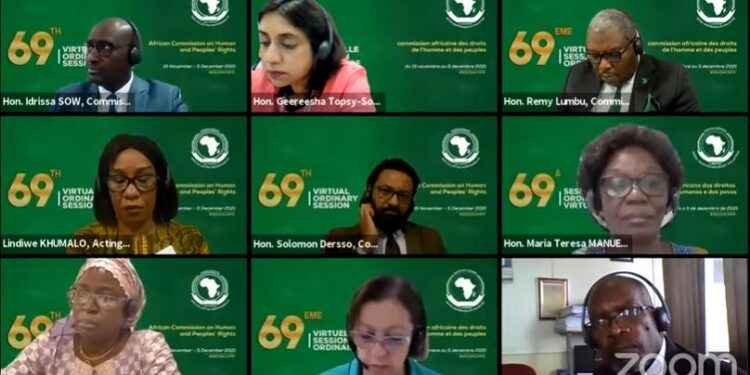Speakers at the 69th Ordinary Session of the African Commission on Human and Peoples’ Rights have painted a gloomy picture of the human rights situation in the continent.
They complained about restrictive Covid-19 containment measures; military takeovers; crackdowns on journalists, media, and protesters; and violent elections.
Solomon Ayele Dersso, the commission’s outgoing chairman, aptly summed up the general sentiment, referring to the current times as signifying “…one of the worst recessions in terms of respect for and protection of human and peoples’ rights” in the continent.
He lamented the shrinking civic space in many nations and singled out the sweeping restrictions introduced in the wake of the Covd-19 pandemic and their abusive application as contributing a great deal to the decline.
Democratisation in Africa, and generally in the world, has continued to deteriorate, while authoritarianism is on the rise, he said, pointing out that manipulated elections, and human rights language and good governance were being used to mask the real situation on the ground.
Unconstitutional seizure of power was one of the points that elicited concern, with 2021 being cited as making history with four successful military takeovers that led to the suspension of constitutional processes and hence legal human rights guarantees.
The African Commission on Human and Peoples’ Rights (ACHPR) session, which is being conducted online, commenced on November 15, 2021 and will run up to December 5, 2021. Remy Ngoy Lumbu of the Democratic Republic of the Congo was elected as the new chairperson, and Maya Sahli-Fadel of Algeria as vice-chairperson. The commission meets two times a year in ordinary sessions, and may hold extraordinary sessions.
Hannah Foster, who represented the NGO Forum, remarked that as the commission celebrated its 40th anniversary, the human rights scene in Africa had changed. She said NGOs had played an important role in this and were willing to continue working with the commission to achieve even greater success.
“Africa, unfortunately, continues to face human rights violations characterised by conflict, insecurity, and violence. Covid-19 has also worsened the situation, with limited to no access to vaccines,” she remarked.
Angola’s minister of human rights, Ana Celeste Januario, emphasised the importance of strengthening the relationship between states and the ACHPR. The minister lamented that lack of funding, disregard for and lack of implementation of some policies, and political interference were some of the key challenges facing the African Charter on Human and Peoples’ Rights.
“The mandate of implementing the policies lies with the states and if they are not compelled to follow through then the violations of human rights in Africa are likely to occur. This leads to interference by international bodies like the International Criminal Court,” Joseph Whittal, Ghana’s Commissioner of Human Rights and Administrative Justice, said.
He also expressed concern about gross violations of human rights reported in some states, particularly Ethiopia, adding that Ethiopians were looking up to the commission to intervene and save vulnerable groups such as women, children, and the elderly.
The ACHPR condemned terrorist attacks in many parts of the continent, including Niger, and unconstitutional change of government, as seen in Sudan, and urged national human rights institutions to investigate and report on unconstitutional changes of government and terrorism as a violation of human rights.
The European Union’s Special Representative for Human Rights, Eamon Gilmore, expressed concern about the situation in Ethiopia, particularly “the alarming humanitarian situation and the deeply disturbing report of human rights violations and abuses as well as violations of international humanitarian law” and the devastating impact of the year-long conflict on the civilian population.
Commenting on the military takeover in Sudan, Gilmore said: “The AU and EU stand together in firmly condemning human rights violations and abuses, serious violations of international humanitarian law, as well as attacks against democratically elected leaders whenever they occur. We jointly call for accountability for these violations and abuses.”
He commended the commission for its achievements, one of which he said was Africa’s unique position as the only region that has a charter on the welfare of the child.
Marcel Akpovo, the UN Human Rights, Regional Representative for East Africa and to the African Union, highlighted violations against journalists, the media, and civil society organisations in some African countries.
“Gender inequality leads to poor economic and social development of states. Inequality was a glaring problem that was exposed by the Covid-19 pandemic. Climate changes have also led to human rights violations and cannot be ignored in the African continent anymore,” he said.
The commission said it had partnered with organisations such as the United Nations to help in implant its mandate in Africa and urged AU members to submit regular reports.
In its address, Human Rights Watch (HRW) said the Covid-19 pandemic had exposed glaring economic inequalities and African governments’ weak social protection systems and failure to fulfill peoples’ rights to social security and adequate standard of living.
The human rights organisation asked the African Commission to urge all Africa states, “notably Burkina Faso, Cameroon, Chad, Central African Republic, Eswatini, Ethiopia, Guinea, Kenya, Mali, Mozambique, Niger, Nigeria, South Sudan, Sudan, Tanzania, and Uganda” to ensure that Covid-19 and other emergency social protection measures address the needs of women and girls against sexual and gender-based violence; investigate allegations of human rights violations committed by members of the security forces; and ensure respect and protection for the right to regular, free, fair, and credible elections, as well as the right to peaceful protest and assembly.
“The AU often reduces democracy to holding elections and selective respect for term limits. The AU political organs are often silent about governments’ human rights abuses, including corruption, governments inertia in fighting poverty, inequality, and infringements on the rule of law and fair electoral governance,” HRW said.







